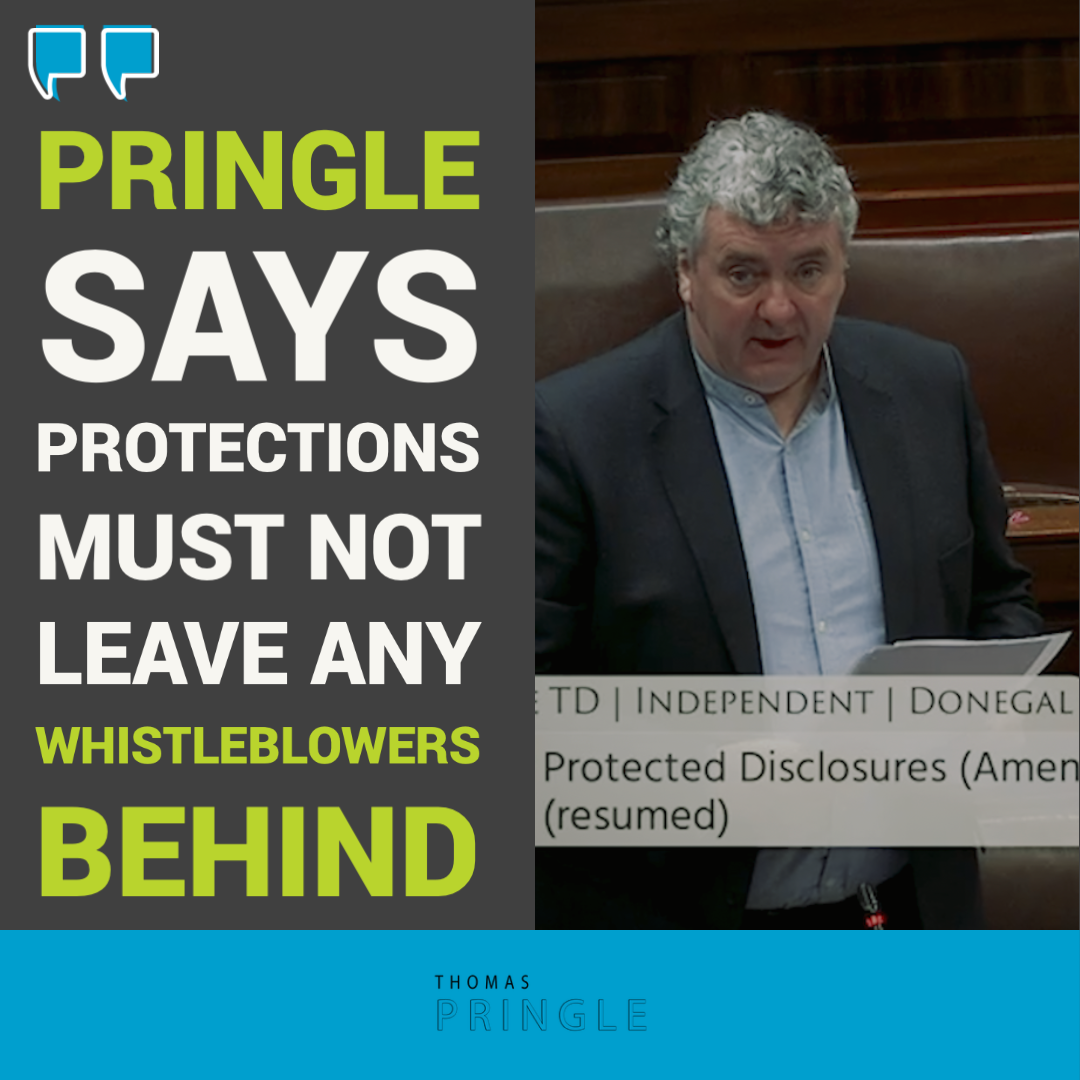- Pringle: We need a policy that recognises the importance of inshore fishing
- Pringle: Disabled people and carers face crisis of State neglect
- Pringle: Failed FF/FG housing policies forcing people to put their lives on hold
- Pringle welcomes Donegal council motion on Occupied Territories Bill: ‘We cannot stand by in the face of genocide’
Pringle says protections must not leave any whistleblowers behind
- Updated: 17th February 2022

Independent TD for Donegal, Thomas Pringle, said protections for whistleblowers must address legacy cases, saying legislation “must not leave whistleblowers behind”.
Addressing the Dáil on Wednesday evening on the Protected Disclosures Bill 2022, Deputy Pringle said: “Whistleblowers play a vital role in exposing illegality, corruption and wrongdoing in this country, and so we must ensure that they are being protected at all costs. This is an incredibly important bill, but we must ensure that we get it right.”
The deputy said that during pre-legislative scrutiny of the bill, the Committee on Finance, Public Expenditure and Reform heard from many who had made protected disclosures.
Deputy Pringle said: “I would like to take the opportunity to pay tribute to those whistleblowers for their bravery. It is said that more cases of corruption are exposed by whistleblowers than any organisation, and we must recognise the important role that they play in our democracy.
“We need to make sure that those who make disclosures in the future are not faced with the same negative experience and we also must ensure that legacy cases are addressed in the legislation. This bill must not leave those whistleblowers behind. I cannot emphasise enough how important it is that all protected disclosures be included in this legislation,” he said.
Noting that the bill requires that private-sector entities with 50 or more employees establish formal whistleblowing channels, he asked why it has been limited in that way.
Deputy Pringle said: “Surely every organisation should be required to establish formal whistleblowing channels, no matter their size. We must strive to ensure that we protect those who report wrongdoing, no matter the size of their organisation.”
The deputy also noted that the bill establishes a protected disclosures commissioner in the Office of the Ombudsman and sets out requirements for ministers to send all reports they receive to the new commissioner.
Deputy Pringle said: “I understand that ministers often feel that they are limited in what they can do to follow up on reports. I have experienced this myself with the Brandon report, and under this new legislation the commissioner takes responsibility for directing reports to the most appropriate actor to address the matter, which will ensure an independent follow-up of disclosures sent to ministers.
“I welcome this with caution and I hope that we ensure that this office is resourced and run appropriately,” he said.
Calling the bill, “well needed and long overdue”, the deputy welcomed the fact that the minister said he is open to amendments. He said he was “incredibly disappointed” that the bill does not address protected disclosures made before the legislation came into existence and urged the Minister to take into consideration all protected disclosures, no matter when they have been made.
He said: “Whistleblowers in this country have been failed time and time again and we have to make sure that we don’t continue to fail them in the future. In my view this legislation in its current form continues to fail them,” he said.
The deputy said whistleblowers must feel they can come forward, “because that’s the only way that we make our democracy more accountable and it’s the only way that we make our public services and actually the private sector more accountable, and work for the good of everybody rather than the good of the few. And that’s what really should be the import of this bill.”



